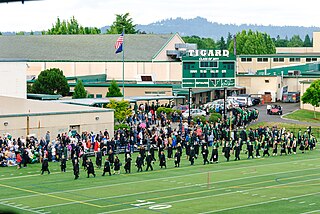A Master of Business Administration is a postgraduate degree focused on business administration. The core courses in an MBA program cover various areas of business administration such as accounting, applied statistics, human resources, business communication, business ethics, business law, strategic management, business strategy, finance, managerial economics, management, entrepreneurship, marketing, supply-chain management, and operations management in a manner most relevant to management analysis and strategy. It originated in the United States in the early 20th century when the country industrialized and companies sought scientific management.

Postgraduate education, graduate education, or graduate school consists of academic or professional degrees, certificates, diplomas, or other qualifications usually pursued by post-secondary students who have earned an undergraduate (bachelor's) degree.
A bar association is a professional association of lawyers as generally organized in countries following the Anglo-American types of jurisprudence. The word bar is derived from the old English/European custom of using a physical railing to separate the area in which court business is done from the viewing area for the general public.

Legal education is the education of individuals in the principles, practices, and theory of law. It may be undertaken for several reasons, including to provide the knowledge and skills necessary for admission to legal practice in a particular jurisdiction, to provide a greater breadth of knowledge to those working in other professions such as politics or business, to provide current lawyers with advanced training or greater specialisation, or to update lawyers on recent developments in the law.
A Bachelor of Laws is an undergraduate law degree offered in most common law countries as the primary law degree and serves as the first professional qualification for legal practitioners. This degree requires the study of core legal subjects and jurisprudence to provide a comprehensive understanding of the legal system and its function. The LLB curriculum is designed to impart a thorough knowledge of legal principles, legal research skills, and a sound understanding of the roles and responsibilities of lawyers within society. This degree is often a prerequisite for taking bar exams or qualifying as a practicing lawyer, depending on the jurisdiction. Additionally, the LLB program also serves as a foundation for further legal education, such as a Master of Laws (LLM) or other postgraduate studies in law.

Secondary education is the last six or seven years of statutory formal education in the United States. It culminates with twelfth grade. Whether it begins with sixth grade or seventh grade varies by state and sometimes by school district.
Alternative education encompasses many pedagogical approaches differing from mainstream pedagogy. Such alternative learning environments may be found within state, charter, and independent schools as well as home-based learning environments. Many educational alternatives emphasize small class sizes, close relationships between students and teachers and a sense of community.
A Master of Laws is an advanced postgraduate academic degree, pursued by those either holding an undergraduate academic law degree, a professional law degree, or an undergraduate degree in a related subject. In most jurisdictions, the LL.M. is the advanced professional degree for those usually already admitted into legal practice.

In education, a curriculum is broadly defined as the totality of student experiences that occur in the educational process. The term often refers specifically to a planned sequence of instruction, or to a view of the student's experiences in terms of the educator's or school's instructional goals. A curriculum may incorporate the planned interaction of pupils with instructional content, materials, resources, and processes for evaluating the attainment of educational objectives. Curricula are split into several categories: the explicit, the implicit, the excluded, and the extracurricular.
Pre-medical is an educational track that undergraduate students in the United States pursue prior to becoming medical students. It involves activities that prepare a student for medical school, such as pre-med coursework, volunteer activities, clinical experience, research, and the application process. Some pre-med programs providing broad preparation are referred to as “pre-professional” and may simultaneously prepare students for entry into a variety of first professional degree or graduate school programs that require similar prerequisites.
A school leaving qualification is an academic qualification awarded for the completion of secondary education. Depending on the country or region, it may alternatively be known as a high school diploma, senior secondary leaving certificate, high schools general certificate or school certificate.

A law school is an institution, professional school, or department of a college or university specializing in legal education, usually involved as part of a process for becoming a judge, lawyer, or other legal professional within a given jurisdiction. Depending on the country, legal system, or desired qualifications, the coursework is undertaken at undergraduate, graduate, or both levels.

Homeschooling constitutes the education of about 3.4% of U.S. students as of 2012. The number of homeschoolers in the United States has increased significantly over the past few decades since the end of the 20th century. In the United States, the Supreme Court has ruled that parents have a fundamental right to direct the education of their children. The right to homeschool is not frequently questioned in court, but the amount of state regulation and help that can or should be expected continues to be subject to legal debate.
Alternative teacher certification is a process by which a person is awarded a teaching license even though that person has not completed a traditional teacher certification program. In the US, traditional teacher certification is earned through completing a bachelor's or master's degree in education, taking standardized tests, and fulfilling additional state requirements. Alternatively certified teachers typically possess a bachelor's degree from an accredited college or university and are completing an alternative certification program while teaching full-time. Other state certification requirements, such as the type of education coursework or the length of practice teaching, may be modified or waived. In the United States, alternative certification is offered in forty-eight states and the District of Columbia. Program prerequisites vary by state, but if you have a bachelor's degree and are legally eligible to work in the US, you'll likely meet the minimum requirements!
The system of education in Iceland is divided in four levels: playschool, compulsory, upper secondary and higher, and is similar to that of other Nordic countries. Education is mandatory for children aged 6–16. Most institutions are funded by the state; there are very few private schools in the country. Iceland is a country with gymnasia.

A certified teacher is an educator who has earned credentials from an authoritative source, such as the government, a higher education institution or a private body or source. This teacher qualification gives a teacher authorization to teach and grade in pre-schools, primary or secondary education in countries, schools, content areas or curricula where authorization is required. While many authorizing entities require student teaching experience before earning teacher certification, routes vary from country to country.
The basic requirement for pharmacists to be considered for registration is often an undergraduate or postgraduate pharmacy degree from a recognized university. In many countries, this involves a four- or five-year course to attain a bachelor of pharmacy or master of pharmacy degree.

Commercial driver's license training is a specialized instructional program or course designed to prepare a student to obtain a commercial driver's license (CDL), which is required for a career as a truck driver in the United States. During training, students are taught the necessary knowledge and skills to pass a series of tests to obtain their CDL. Such a program generally begins with classroom instruction geared towards passing the written exams for a CDL permit, a learner's permit that allows a student to practice driving skills on public roads with a CDL licensed driver or instructor. Students graduate from CDL training upon receiving their CDLs and proving that they can comfortably and safely drive and maneuver a truck. Most CDL training schools train drivers for a class A CDL, which allows the holder to drive a tractor trailer weighing over 26,000 pounds. Some CDL training schools incorporate truck driving simulators into their curriculum to help student drivers learn the basics of driving a truck — including shifting gears, braking, and parking.
A high school diploma is a diploma awarded upon graduation of high school. A high school diploma is awarded after completion of courses of studies lasting four years, typically from grade 9 to grade 12. It is the school leaving qualification in the United States and Canada.

K-12 education in the United States includes primary education starting in kindergarten, and secondary education ending in grade 12. Government-funded free schools are generally provided for these grades, but private schools and homeschooling are also possible. Most children begin elementary education with kindergarten and finish secondary education with twelfth grade. In some cases, pupils may be promoted beyond the next regular grade. Parents may also choose to educate their own children at home; 1.7% of children are educated in this manner.








